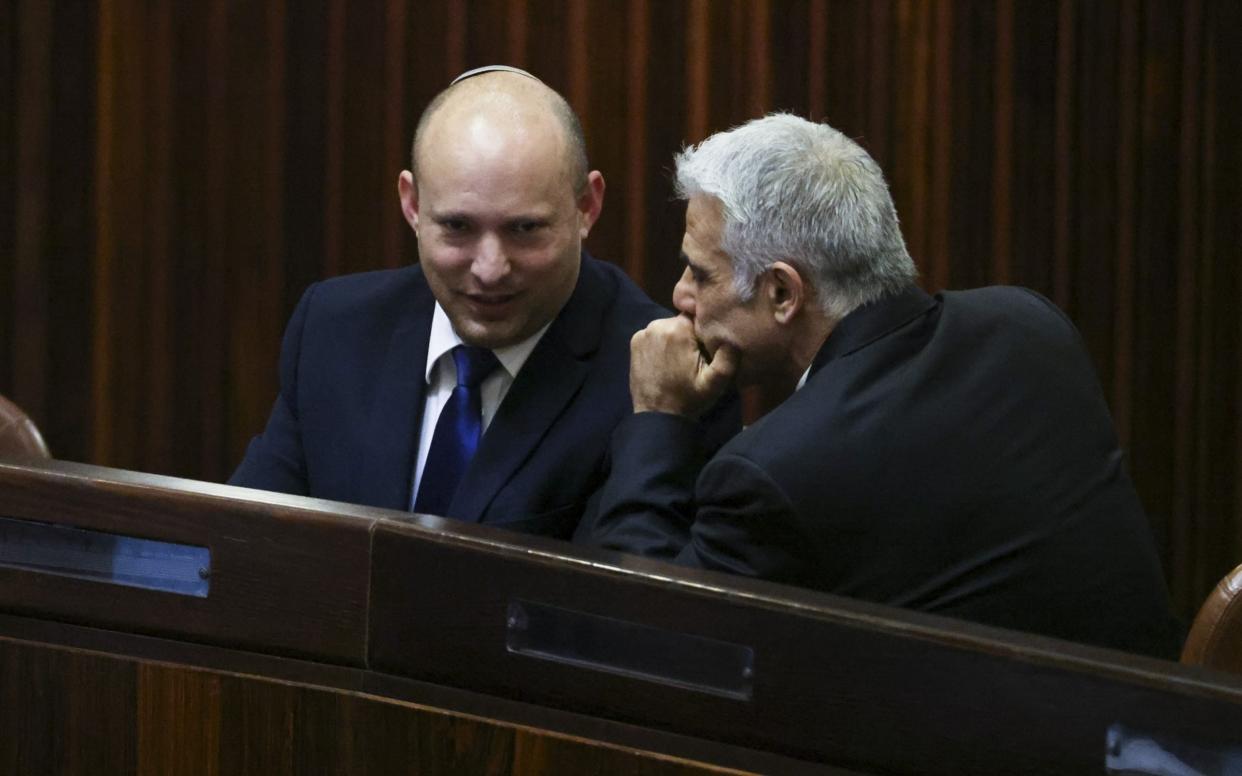Israel: Benjamin Netanyahu poised for exit as opposition proclaims new coalition government

- Oops!Something went wrong.Please try again later.
- Oops!Something went wrong.Please try again later.
- Oops!Something went wrong.Please try again later.
Israel’s opposition leader on Wednesday night announced he had formed a coalition to oust Benjamin Netanyahu, in what could be the death knell for the embattled prime minister’s career.
With just half an hour to spare before his mandate to form a government expired at midnight, Yair Lapid announced he had struck a coalition deal that drew support from across the political spectrum.
"The government will do everything it can to unite every part of Israeli society," Mr Lapid, the head of the centrist party Yesh Atid, said after informing the Israeli president that he had secured a majority in the Knesset, the Israeli parliament.
Under the terms of the deal, right-wing Yamina party leader Naftali Bennett will serve as prime minister for two years before handing the reins to Mr Lapid.
In a phone call with Israel's president informing him of the agreement, Mr Lapid said: "This government will work to serve all the citizens of Israel including those who aren't members of it, will respect those who oppose it, and do everything in its power to unite all parts of Israeli society."

The coalition will include the Islamist party Ra’am, it was announced on Wednesday night, marking the first time in Israel’s history that an Arab party has agreed to join a government. Previously, parties representing Israel’s Arab minority have only supported governments from the outside.
On Wednesday night, Ra'am party leader Mansour Abbas said the coalition would "benefit the Arab public, without the irresponsible dreams Netanyahu promised him," referring to Israel's prime minister.
He added: "There are not nationalist elements, only the good of the public - education, infrastructure, health, law enforcement and more."
Mr Abbas posed for a photograph alongside Mr Lapid and Mr Bennett as they prepared to sign the coalition agreement (below).
They say Netanyahu is a divisive politician, but he did bring together some pretty unusual allies ... to kick him out of office. Pictured: Yair Lapid, secular leader of Israeli opposition, Naftali Bennett, settler party head, and Mansour Abbas, leader of Islamist Arab party Raam. pic.twitter.com/7D80Gtod3R
— Yair Rosenberg (@Yair_Rosenberg) June 2, 2021
Mr Bennett, a former protégé of Mr Netanyahu, is a strong supporter of expanding Israeli settlements and annexing swathes of the West Bank.
However, as the government will have to carefully navigate the conflicting demands of the Right and Left wing, as well as Ra’am, it may struggle to find much common ground beyond its determination to oust Mr Netanyahu.
The coalition still needs to be approved by the Knesset in a vote next week, while Mr Netanyahu's party is reportedly hoping to derail the process by persuading members to switch sides.
Read more: What next for Netanyahu?
Mr Bennett has acknowledged that compromises will need to be made on key policies.
“Everyone will have to postpone the realization of some of their dreams. We will focus on what can be done, instead of arguing over what is impossible,” he said in a speech earlier this week.

Cracks were already forming in the coalition on Thursday morning as the left-wing Meretz party vowed to make advancing LGBT rights a key policy.
In response, the socially conservative Ra'am party protested that "we won’t support anyone forcing on us values that our community doesn’t believe in.”
It came as the Israeli parliament elected a new president on Wednesday, Isaac Herzog, who will replace Reuven Rivlin in July and serve a seven-year term.
The role is ceremonial, with power concentrated in the hands of the Israeli parliament and the prime minister.
Mr Netanyahu, who is currently on trial for corruption charges that he strongly denies, has claimed that the coalition will endanger the state of Israel.
He has also accused Mr Bennett of committing “the fraud of the century” by courting centrists and left-wingers in the Israeli parliament.
Mr Lapid’s agreement could prove to be the final chapter in the Netanyahu dynasty, which has dominated Israeli politics for more than a decade.
It may also bring an end to the Jewish state’s worst political crisis in modern history, which has seen four inconclusive election results since April 2019.
Read more: Profile: Naftali Bennett, the tough-talking right-winger poised to oust Benjamin Netanyahu

